The rain is easing, but the risk of further flooding remains high, warned the Scottish Government on Sunday afternoon.
The emergency meeting of the Scottish Government’s Resilience Room (SGoRR) on October 8 assessed the latest impacts of the weekend’s severe rainfall across the country.
Although conditions are improving, it said, river levels are continuing to rise and the overall flood risk is high. A Met Office yellow warning of rain is in place until 7pm this evening and a further yellow warning of rain has been issued for parts of western Scotland for Tuesday.
Multi-agency resilience arrangements have been stood up in the north and west of the country to co-ordinate the on-the-ground response and support anyone affected by flooding and severe weather.
The road and rail network remains disrupted across the country on Sunday and the advice is to travel with caution.
Cabinet Secretary for Justice and Home Affairs Angela Constance said: “The rainfall we have seen over Scotland this weekend has been extreme, causing significant disruption –particularly in the west and north of the country. These impacts are ongoing, and I want to put on record my thanks to all the staff and volunteers responding across the country.
“The flooding risk remains a key concern over the next few hours and days, with extremely high river levels and saturated ground. Our multi-agency response teams stand ready and prepared to respond to any flooding incidents. Some local councils have also set up rest centres in their areas.
“Travel disruption has continued on Sunday and the priority is now to restore normality as far as possible by Monday morning. I would, however, urge anyone planning to travel over the next few days to do so with caution.”
Head of Transport Resilience (Operations) at Transport Scotland Stein Connelly said: “It’s been an extremely challenging 72 hours, with perhaps some of most difficult conditions we’ve experienced since the Beast from the East.
“I would like to thank the public for their patience and for heeding police travel advice and driving to the conditions. I also want to express our thanks to our operating companies and staff who have worked during horrendous conditions to get the network back up and running.
“In terms of Argyll, the area around the A83 Rest and Be Thankful saw a month’s worth of rainfall, around 160mm, fall over 36 hours. The catch pits and fences have ensured only a small amount of debris has reached the road at the Rest and Be Thankful itself. Safety inspections are now underway, and teams are on site to begin clear-up operations once it is deemed safe to do so.”
Police Scotland Assistant Chief Constable Tim Mairs said: “Communities across Scotland have dealt with some of the most challenging conditions they have faced and I would like to thank the public for their co-operation and for sticking to the travel advice in place to keep people safe.
“While the picture is gradually improving, we are still dealing with flooding, a number of road closures and hazardous driving conditions due to surface water so I would remind people to please exercise caution on the roads.
“The situation in Argyll and Bute remains extremely challenging, with a number of main routes closed. In that area I would urge people to consider if their journey is really necessary or if it can be delayed until conditions improve further.
“If you need to travel, please drive to the conditions and take extra time for your journey.”
Argyll and Bute was worst hit by the torrential rains on Saturday, when all major roads into the region were blocked by floods and landslides. Locals were checking the damage to properties on Sunday, as authorities worked to clear the roads, and get traffic moving in and out again.
Argyll and Bute was worst hit by the torrential rains on Saturday, when all major roads into the region were blocked by floods and landslides. Locals were checking the damage to properties on Sunday, as authorities worked to clear the roads, and get traffic moving in and out again.
Roads
A85 – Open
One lane of the A85 has re-opened near Lochawe, with a convoy system in place. However, it is closed further east between Crieff and Perth at Methven.
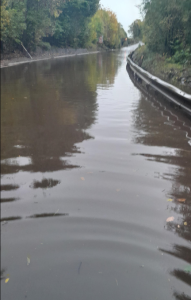
The picture above, taken by BEAR Scotland, showed the flood on Sunday morning, which is now receding, north of the village of Lochawe.
A83 – Closed
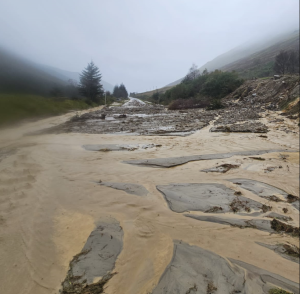
The A83 closed on Saturday due to multiple landslides.
The area around the A83 Rest and Be Thankful saw a month’s worth of rainfall, around 160mm, fall over 36 hours. The catch pits and fences have ensured only a small amount of debris has reached the road at the Rest and Be Thankful itself.
Within the road closed section of the A83 between Inveraray and the Rest and Be Thankful, six further landslips have been identified and around 2,000 tonnes of debris is deposited on the A83 at this time.
Safety inspections are now underway, and teams are on site and beginning clear-up operations where it is deemed safe to do so.
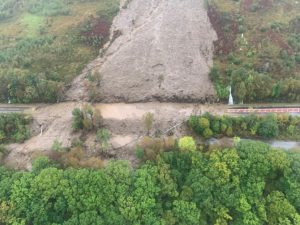
Road closures are in place between Inveraray and Tarbet due to landslides both sides of Dunoon junction. The hard closure point is at Ardgarten, with Road Closed Ahead at Tarbet.
The diversion via A819/A85/A82 at A85 Dalmally is open, BEAR Scotland said at 1.30pm on Sunday. Western Ferries, route from Gourock to Dunoon, is currently available.
“Road closures are in place on the A85 at Loch Awe, the A828 Benderloch and the A84 Anie Straights (south of Strathyre) due to flooding,” a spokesperson added. “We are continuing to assess the situations locally while waiting for the flood waters to subside.”
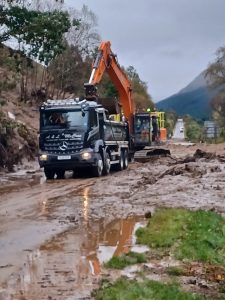
Ian Stewart, BEAR Scotland’s North West Representative, said: “This extreme weather has caused widespread disruption, with Argyll significantly affected. Our teams are beginning clear up operations to return full access to residents of Argyll, but conditions are still difficult, and we need to ensure that those on site are safe. As such, it is unlikely the A83 will reopen today.”
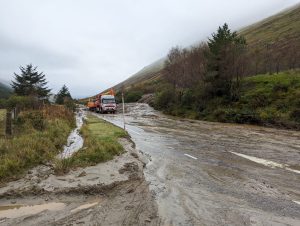
More details will be available as clear up operations continue. Until then, Police Scotland advice is to avoid travel in Argyll and Bute and the A83 at the Rest and Be Thankful will remain closed.
Footage of a landslide on the A83 was posted by Craig Hendry on Saturday, here.
A816 – Closed
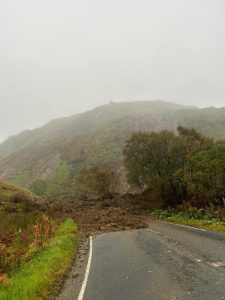
The A816 is closed at Ardfern, between Oban and Lochgilphead, due to a large landslide at the Bealach on Saturday, photographed (above) by Chris Taylor and (below) by Aidan Gregory.
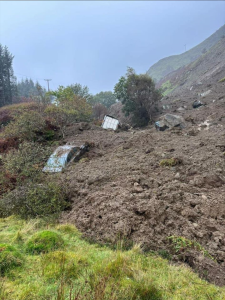
One witness reported on Sunday morning: “A tour bus has just tried to drive up the Bealach and had to reverse all the way down. Lots of vehicles having to turn round at Ardfern road end.” Drone footage, taken by Gordon Turner, shows the sheer size of the landfall here.
Ford to Dalavich – Closed
The road between Ford and Dalavich, on the west bank of Loch Awe, is closed due to flooding and debris, photographed below by Tim Donnachie.
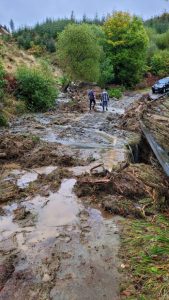
A828 – Open
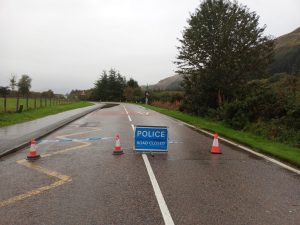
The A828 between Benderloch and Creagan Bridge was closed on Saturday due to a flood, cutting off a link between Oban and Fort William. On Sunday afternoon, the A828 road became passable with care between Connel and Ballachulish.
A82 – Open at Glencoe
The A82 at Glencoe is now no longer restricted. However, the A82 is closed south of Inverness near Lochend. In Fort William, the new Lochyside flood defences help up, photgraphed by Iain Ferguson.
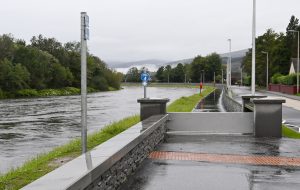
A84 – Closed
Floods closed the A84 between Kilmahog and Strathyre, south-east of Lochearnhead, on Sunday morning, affecting traffic travelling west from Stirling and Edinburgh.
One witness said at midday: “Knee deep water on stretch after strathyre on A84 to Stirling. Huge tailback, no one getting through. All cars are all turning around.”
A884 – Open
The A884 has now re-opened at Lochaline.
B8007 – Open
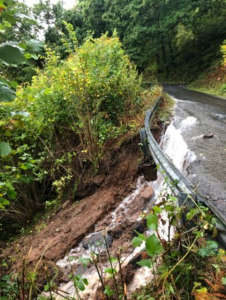
On Saturday the B8007 between Salen and Kilchoan on the Ardnamurchan Peninsula was closed at Ardslignish, due to flooding with a risk of landslip (pictured above), but the road was reopened on Sunday.
The Highland Council updated: “Following the closure of the B8007 on October 7, due to flooding with the risk of landslip, an assessment has been made today (October 8) and repair works will be required over the next five days (approximately). The B8007 has reopened today (October 8) and is passable with care. There is no alternative route.
“Periodic closures of the road will be required in the coming days for repairs. Repair works will commence at 9am on Monday October 9.
“There will be two hour closures to enable works to take place with approximate 30 minute opening amnesties. Over the coming days the road will be open and closed at the following approximate times and will remain open overnight from 4pm to 9am the following mornings.”
Closed Opening Amnesties
09:00 – 11:00 (closed) 11am – 11.30 (Open)
11.30 – 13.30 (closed) 13.30 – 14:00 (Open)
14:00 – 16:00 (closed) 16:00 – 09:00 (Open Overnight)
Cowalfest Cancelled
The A814, A815 and B836 are closed in the Cowal area. The organisers of the Cowalfest walking festival, due to be held October 12-16, have taken the difficult decision to cancel this year’s event due to unprecedented rainfall on Saturday October 7.
“The effects of this sadly led to mass flooding, landslides and inevitable damage to trails which will take time to remedy,” organisers said.
“The re-establishment of Cowalfest, widely recognised as one of Scotland’s biggest walking festivals, has been the best part of a year in planning and organisers have decided that they would like to still hold the ceilidh in the hope that this will in some way celebrate the effort made to bring the event back. It will take place at Innellan Village Hall on Saturday October 14 and features music from well-known ceilidh band ‘Canned Haggis’.”
Tickets for the ceilidh are available to purchase at Purdies, Dunoon and the Lido in Innellan. All bookings made so far for each of the festival’s fifty plus walks and activities will be refunded in full over the coming days and weeks.
Cowalfest chairperson Agnes Harvey explained: “The decision to cancel the festival was a unanimous one within our committee, all of whom are volunteers and have spent hundreds of hours working on the event over the past 12 months. The decision takes into account the extensive damage to the Cowal landscape caused by flooding and the resulting health and safety risks to walkers and walk guides.
“Our hearts go out to those people whose homes and land have been affected by this destructive rainfall event.”
Oban Flooding
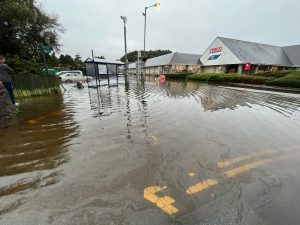
With all major roads in and out of Oban cut off on Saturday, and one by one reopening gradually on Sunday, many people were stranded in the town overnight.
While some found accommodation, others slept in their cars on Saturday night, and spent Sunday looking for toilets. The council-run public toilets on the North Pier were closed on Sunday, but folk have been nipping into the CalMac Ferry Terminal and local pubs.
Atlantis Leisure is providing shelter, and Oban Lorne RFC is also available to anyone who needs a hot shower or warm space.
Supermarkets are busy as people stock up on supplies, but access and the car parks are flooded. Floodwaters are being pumped into the Black Lynn. The road into the town’s Tesco and M&S supermarkets, on Lochavullin Industrial estate, are still closed due to flooding. It’s five years ago to the day that the area was last hit by flooding, shown here.
Oban’s floodwaters drain into the sea at Oban Bay, but less so at high tide, when flood levels peak. The next high tides in Oban are due at 4.04am and 4.30pm on Monday. So far the town has been lucky with the tides: next weekend’s tides are a metre and a half higher.
ScotRail warns of ongoing disruption
ScotRail is warning customers that services will remain disrupted through Sunday following extreme rainfall across much of Scotland, as flooding remains and the cleanup operation continues.
Repair works and safety inspections are underway across Scotland after some areas saw up to a month’s worth of rain in a 24-hour period resulting in heavy flooding across much of the rail network.
Flooding remains an ongoing issue across large areas of Scotland, particularly in the north, with water levels continuing to rise on the Spey and elsewhere. In addition to the ongoing threat of flooding, Saturday’s extreme weather resulted in many trains and staff being left out of place because emergency cancellations and speed restrictions.
Services on the following routes will remain completely closed on Sunday, with normal service scheduled to resume on Monday morning:
- West Highland Line between Glasgow and Oban/Fort William.
- All services between Edinburgh and Perth, Dundee, Aberdeen, and Inverness.
- All services between Glasgow and Perth, Dundee, Aberdeen, and Inverness.
- All services between Kyle of Lochalsh and Inverness.
For the above routes, ScotRail is advising customers not to travel as no rail replacement travel is available.
Some other routes remain affected by speed restrictions as a safety precaution, meaning services may be subject to delay or cancellation.
While the operator is optimistic about restoring normal services on Monday, Network Rail safety teams must wait until flood waters subside to inspect bridges. The greatest risk to a normal restart on Monday is on the Highland Main Line and the Perthshire areas where floodwaters remain high, so passengers whose Monday journey runs between Perth and Inverness or Perth and Stirling are urged check before leaving home tomorrow.
Customers are advised that they should travel only when necessary on Sunday, to expect delays, and to regularly check their journey before travelling on the ScotRail website, app, or social media feeds for live updates.
Customers whose journey has been cancelled or disrupted due to adverse weather this weekend can travel two days after the date on their ticket. Customers can also apply for a fee-free refund on any unused tickets.
David Simpson, ScotRail Service Delivery Director, said: “The weather we have seen over the weekend has been extreme and in some parts of the country we are continuing to see dangerous levels of rainfall and flooding. We appreciate that weather related disruption like this can be frustrating, but our first priority has to be the safety of the public and our colleagues.
“Our staff across the country, alongside colleagues at Network Rail, are working hard to get services back to normal as quickly and safely as possible, with the priority being getting things back to normal for Monday morning.
“Customers are advised that they should check their journey before travelling, and keep an eye on our website, app, or social media feeds for live updates.”